Picture this: you’re at your favorite Dallas restaurant, confidently biting into that perfect steak without a second thought about your teeth. This is the life-changing reality for millions who’ve chosen dental implants—but naturally, you’re wondering just how long this investment in your smile will last.
If you’re considering dental implants or already have them, understanding their lifespan is crucial for making informed decisions about your oral health and financial planning. The good news? With proper care, dental implants can literally last a lifetime, making them one of the most reliable tooth replacement options available today.
Key Takeaways
- Dental implants can last 25+ years or even a lifetime with proper care and maintenance
- The implant post itself has a 95-98% success rate and rarely needs replacement
- Crowns typically last 10-15 years before requiring replacement due to normal wear
- Your oral hygiene habits and lifestyle choices significantly impact implant longevity
- Regular dental checkups are essential for maximizing your implant’s lifespan
Understanding Dental Implant Components and Lifespan
When we talk about how long dental implants last, it’s important to understand that a complete dental implant system has three main parts, each with different lifespans:
The Titanium Implant Post 🦴
The implant post is surgically placed into your jawbone and acts as an artificial tooth root. This titanium component typically lasts 25+ years to a lifetime. Thanks to a process called osseointegration, the implant fuses with your natural bone, creating an incredibly strong foundation.
The Abutment
The abutment connects the implant post to the crown. This component usually lasts as long as the implant itself—often decades with proper care.
The Crown
The crown is the visible tooth portion that handles daily chewing and grinding. Crowns typically need replacement every 10-15 years due to normal wear and tear, though some can last much longer.
Understanding these different components helps explain why your dentist might discuss replacing a crown while keeping the original implant post intact.
Factors That Influence How Long Dental Implants Last
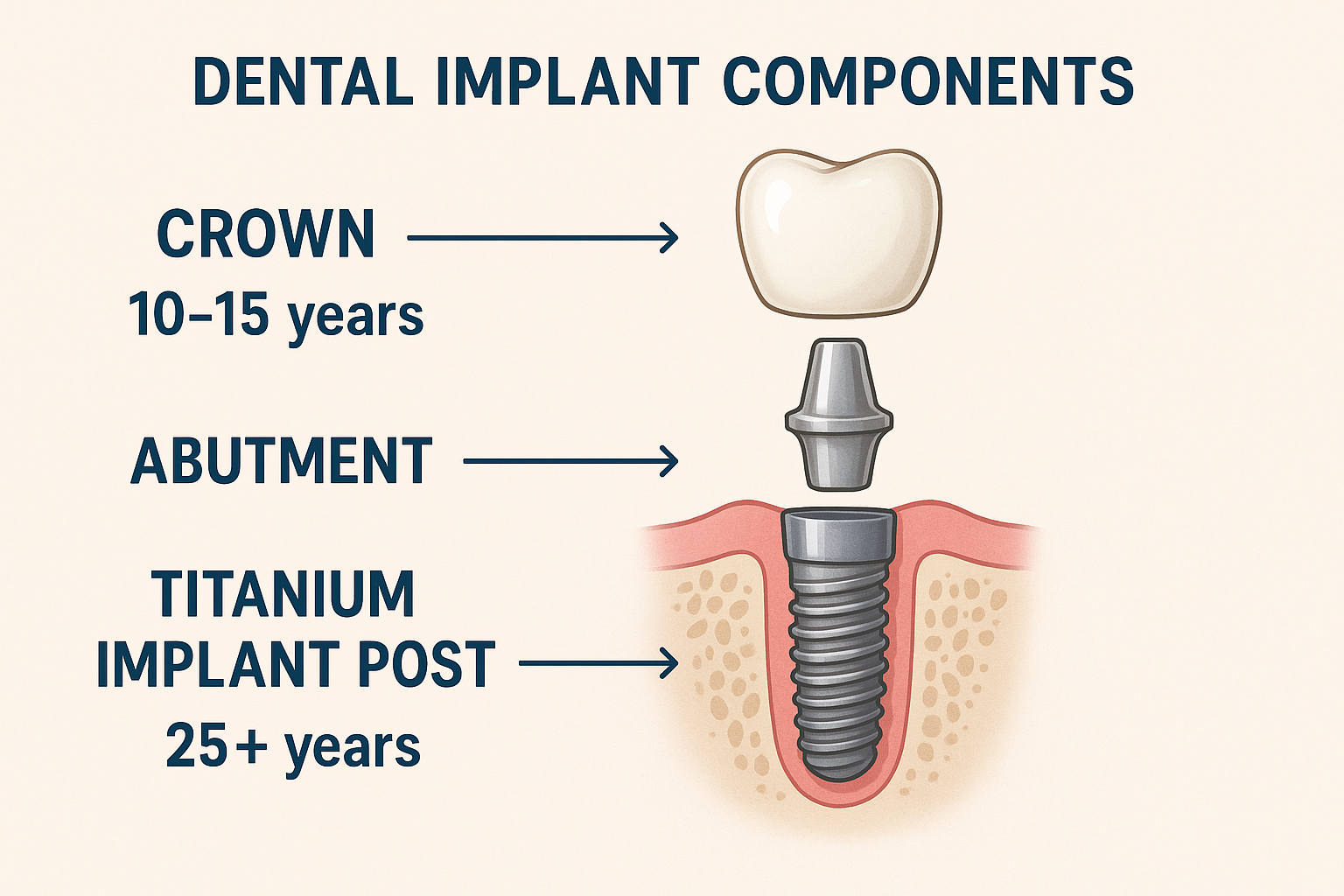
Several key factors determine whether your dental implants will last decades or require earlier intervention:
Oral Hygiene Habits 🪥
Your daily oral care routine is the single most important factor in implant longevity. While implants can’t get cavities, the surrounding gum tissue and bone are still susceptible to infection and disease.
Essential daily care includes:
- Brushing twice daily with a soft-bristled toothbrush
- Flossing around implants with special implant floss
- Using an antibacterial mouthwash
- Regular water flossing to remove bacteria
Lifestyle Choices
Certain habits can significantly impact your implant’s lifespan:
Smoking 🚭 is the biggest threat to implant success, reducing blood flow and slowing healing. Smokers have higher failure rates and shorter implant lifespans.
Teeth grinding (bruxism) can place excessive force on implants, potentially causing damage over time. A custom night guard can protect your investment.
Diet choices matter too—while you can eat most foods with implants, avoiding extremely hard items like ice or hard candy helps prevent damage.
Quality of Initial Placement
The expertise of your dental team plays a crucial role. Proper surgical technique, appropriate implant selection, and precise placement all contribute to long-term success. This is why choosing an experienced dental implant specialist in Dallas is so important.
Bone Health and Density
Adequate bone density provides the foundation for successful implant integration. Patients with conditions affecting bone health may need additional treatments to ensure optimal implant longevity.
Expected Lifespan by Implant Type
Different types of dental implants have varying lifespans based on their design and placement:
Single Tooth Implants
Expected lifespan: 25+ years Single implants typically have the longest lifespan because they bear the most natural load distribution and are easiest to maintain.
Implant-Supported Bridges
Expected lifespan: 15-20 years These replace multiple teeth using fewer implants, which can experience slightly more stress than single implants.
All-on-4 Implants
Expected lifespan: 20+ years for implants, 10-15 years for prosthetics The All-on-4 system provides excellent longevity, though the full arch prosthetic may need replacement before the underlying implants.
Mini Implants
Expected lifespan: 10-15 years Smaller implants typically have shorter lifespans due to their reduced surface area for bone integration.
Signs Your Dental Implant May Need Attention
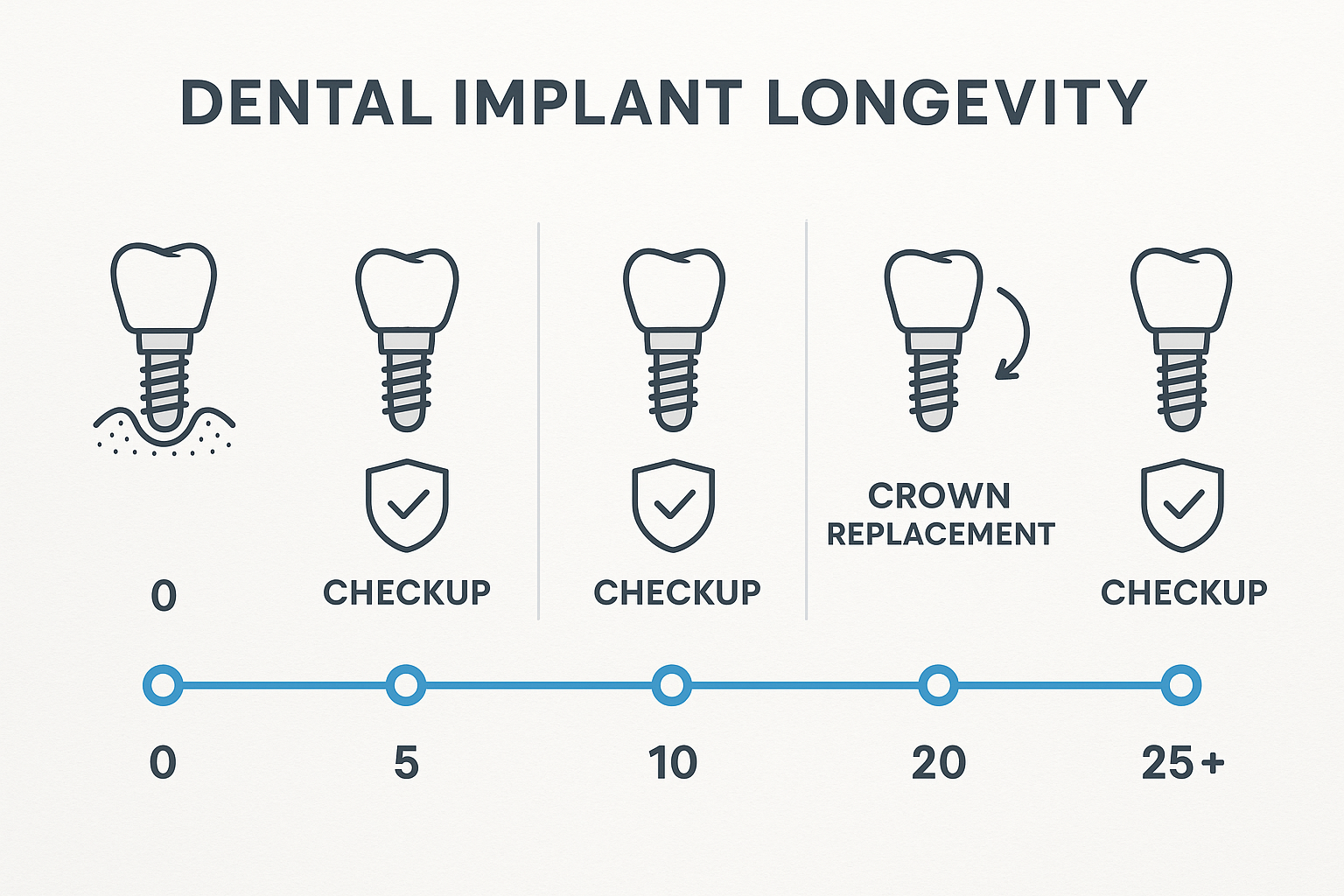
While dental implants are incredibly durable, knowing the warning signs of potential issues can help you address problems early:
Early Warning Signs ⚠️
- Persistent pain or discomfort around the implant
- Swelling or inflammation of surrounding gums
- Bleeding when brushing or flossing
- Loose or wobbly feeling in the crown
- Changes in bite alignment
When to Contact Your Dentist Immediately
- Severe pain that doesn’t respond to over-the-counter medication
- Signs of infection (fever, pus, severe swelling)
- Visible damage to the crown or implant
- Complete loss of the crown or abutment
Remember, catching issues early often means simpler, less expensive treatments to preserve your implant’s longevity.
Maximizing Your Dental Implant Lifespan
Taking proactive steps can help ensure your implants last as long as possible:
Daily Care Routine
Morning routine:
- Brush gently around implants with fluoride toothpaste
- Use interdental brushes for hard-to-reach areas
- Rinse with antibacterial mouthwash
Evening routine:
- Floss carefully around each implant
- Brush thoroughly, paying extra attention to the gumline
- Consider using a water flosser for deep cleaning
Professional Maintenance 👨⚕️
Regular checkups every 6 months allow your dental team to:
- Monitor implant stability and surrounding tissue health
- Perform professional cleanings to remove bacteria buildup
- Take X-rays to check bone levels around implants
- Adjust your crown if needed to maintain proper bite alignment
Protective Measures
If you grind your teeth, wearing a custom night guard can prevent excessive force on your implants during sleep. Athletes should use appropriate mouth guards during contact sports.
Cost Considerations and Insurance Coverage
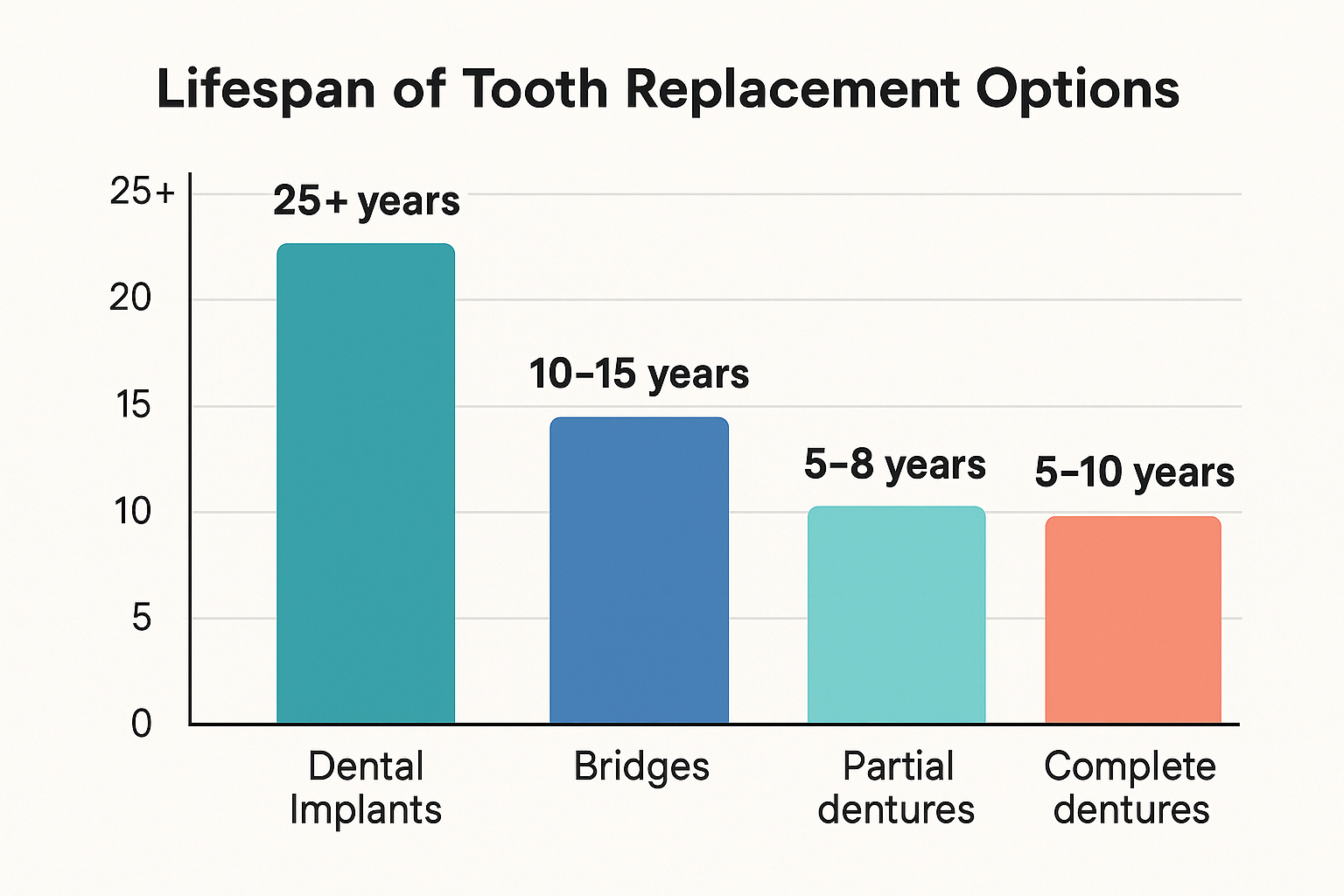
Understanding the financial aspects of implant longevity helps with long-term planning:
Initial Investment vs. Long-term Value
While dental implants require a significant upfront investment, their longevity often makes them more cost-effective than alternatives that need frequent replacement.
Insurance and Coverage Options
Many patients wonder about coverage options. You might find helpful information about whether Medicare covers dental implants or explore Medicaid coverage for dental implants. Some dental insurance plans also provide partial coverage—check if Delta Dental covers implants under your specific plan.
Maintenance Costs
Factor in ongoing costs like:
- Regular dental cleanings and checkups
- Potential crown replacement after 10-15 years
- Night guard if you grind your teeth
- Special cleaning tools for implant care
Comparing Implant Longevity to Alternatives
Understanding how implants compare to other tooth replacement options highlights their value:
| Treatment Option | Average Lifespan | Maintenance Required |
|---|---|---|
| Dental Implants | 25+ years | Daily cleaning, regular checkups |
| Dental Bridges | 10-15 years | Special flossing, regular replacement |
| Partial Dentures | 5-8 years | Daily removal, frequent adjustments |
| Complete Dentures | 5-10 years | Daily removal, regular relines |
This comparison shows why many consider implants the gold standard for tooth replacement.
Real Patient Experiences and Success Stories
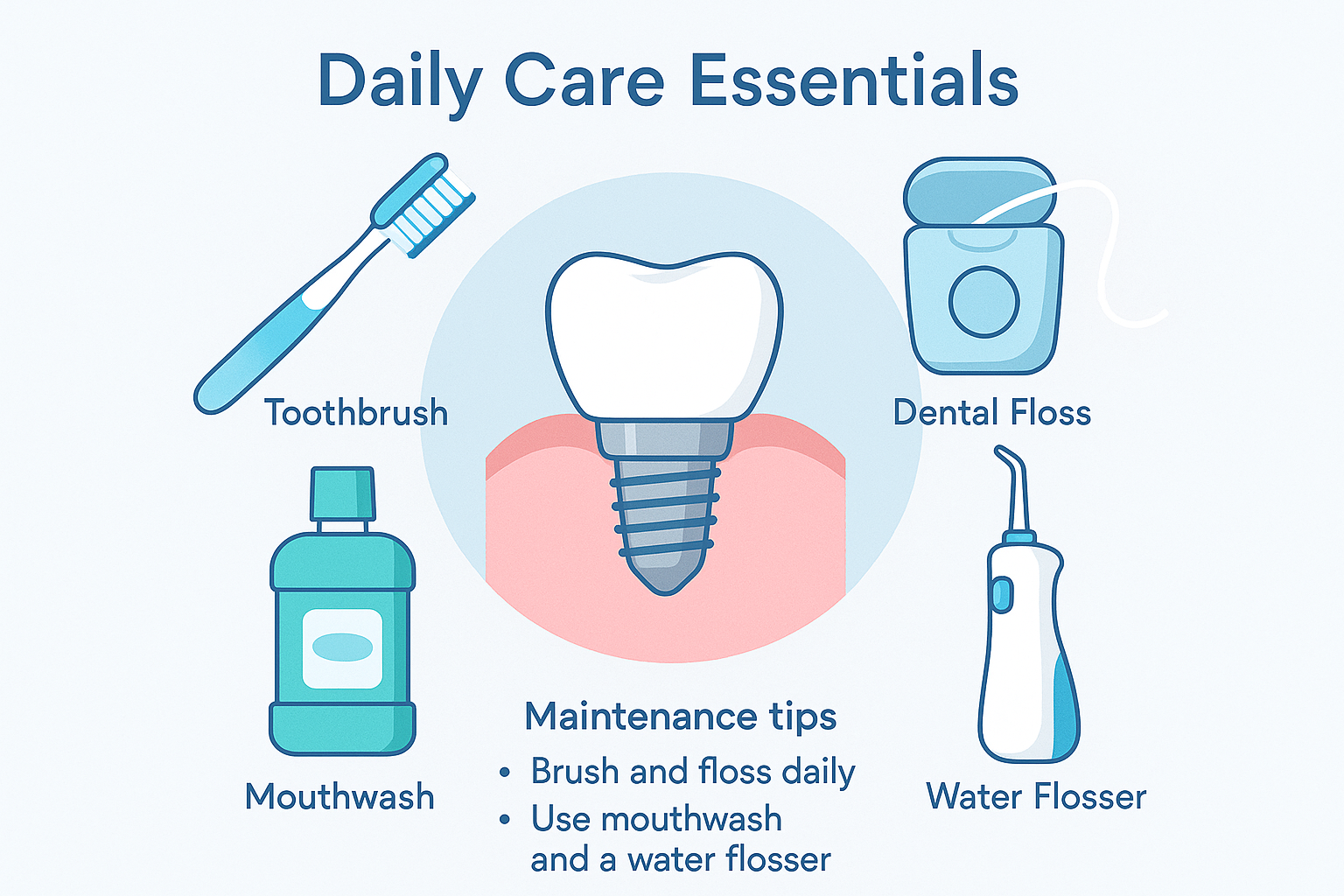
Many patients are amazed by their implant longevity. Some of our Dallas patients have had their implants for over 20 years with no issues beyond routine crown replacement. These success stories often share common factors: excellent oral hygiene, regular dental visits, and healthy lifestyle choices.
Celebrity dental implant cases also demonstrate the long-term success possible with proper care and maintenance.
When Replacement Becomes Necessary
While rare, sometimes implants do need replacement:
Implant Failure Causes
- Severe gum disease (peri-implantitis)
- Insufficient bone integration
- Trauma or injury
- Poor initial placement
- Smoking or other health factors
The Replacement Process
If an implant fails, replacement is often possible after addressing the underlying cause. This might involve:
- Bone grafting to rebuild lost bone
- Treating any infection or disease
- Waiting for proper healing before new implant placement
Future Developments in Implant Technology
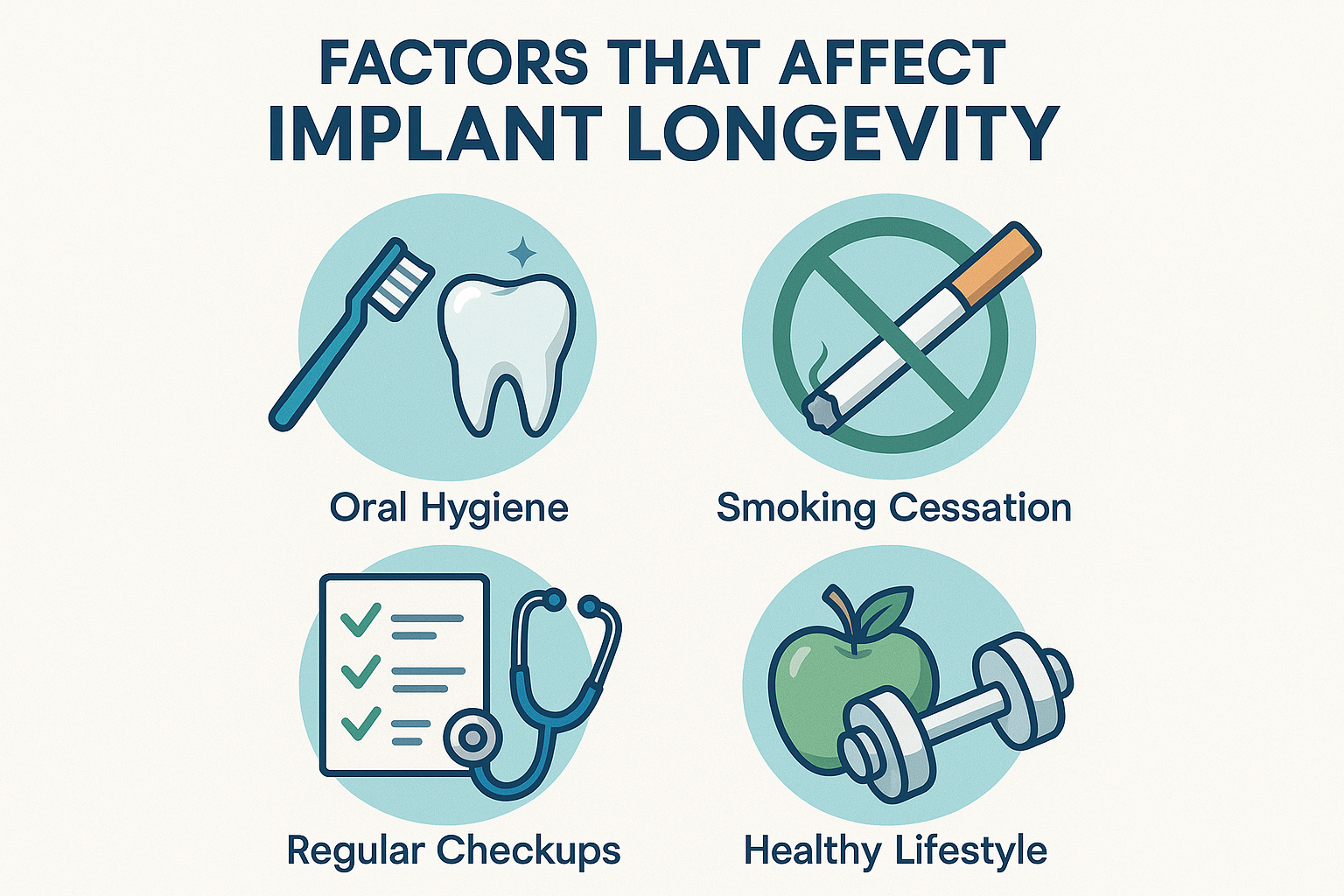
Dental implant technology continues advancing, with new materials and techniques potentially extending lifespans even further:
Emerging Technologies 🔬
- Surface treatments that improve bone integration
- Smart implants with sensors to monitor health
- Advanced materials that resist wear and bacteria
- 3D printing for perfectly customized components
These innovations suggest that implants placed today may last even longer than current expectations.
🦷 Dental Implant Lifespan Calculator
Conclusion
How long do dental implants last? The answer is encouraging: with proper care, your dental implants can last 25 years or even a lifetime. While the crown portion may need replacement every 10-15 years, the implant post itself typically provides decades of reliable service.
Your journey to a confident smile doesn’t end with implant placement—it begins there. By maintaining excellent oral hygiene, attending regular checkups, and making healthy lifestyle choices, you’re investing in a solution that can truly last a lifetime.
Ready to take the next step? If you’re considering dental implants or want to learn more about maximizing your current implants’ lifespan, our experienced team is here to help. We believe every Dallas resident deserves to smile with confidence, and we’re committed to making that dream a reality with expert care and personalized treatment plans.
For more comprehensive information about your implant journey, explore our complete guide to dental implants in Dallas or contact our office to schedule your consultation today. Your future self will thank you for making this life-changing investment in your oral health and confidence.

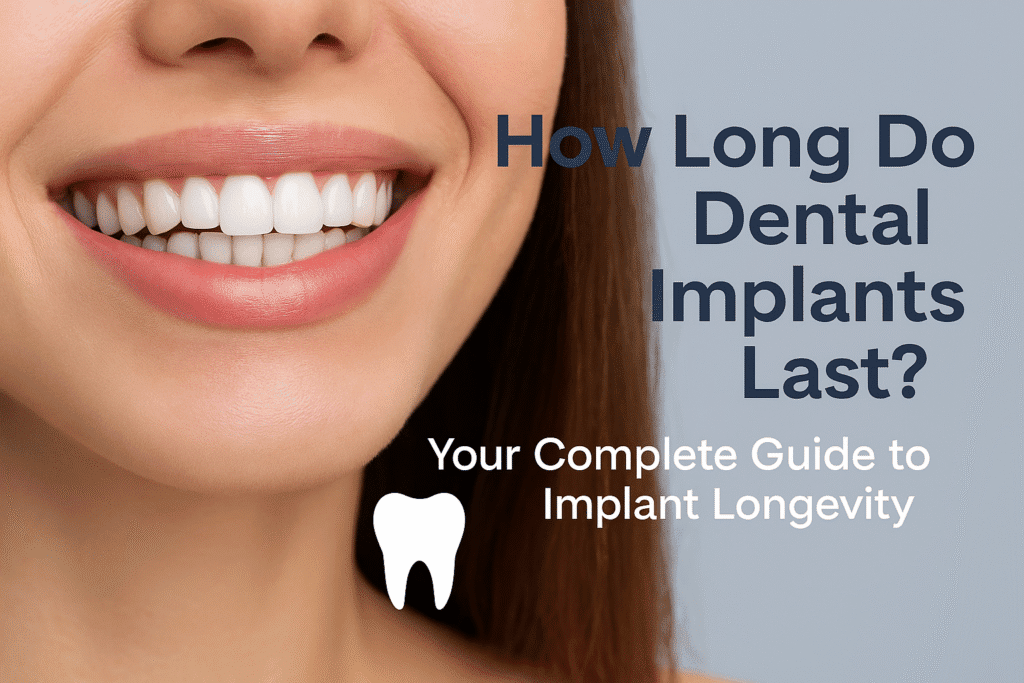
Leave a Reply
Share your thoughts or ask a question about dental implants. Your email address will not be published.